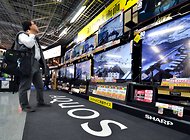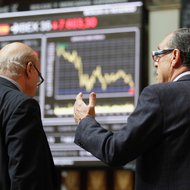 Yoshikazu Tsuno/Agence France-Presse — Getty ImagesSharp flat-panel televisions on display in Tokyo in November.
Yoshikazu Tsuno/Agence France-Presse — Getty ImagesSharp flat-panel televisions on display in Tokyo in November.
TOKYO – Qualcomm will invest $120 million in the struggling Japanese electronics giant Sharp, throwing a fresh lifeline to the company after Sharp issued a dire warning last month about its ability to keep operating.
In a statement, Sharp, the maker of Aquos televisions, said it would issue 4.9 billion yen ($59.7 million) worth of new shares to Qualcomm at 164 yen a share, a slight discount to the company’s closing share price on Tuesday. Sharp said it had secured a second investment of up to 5 billion yen from Qualcomm, which is based in San Diego.
The initial investment is likely to make Qualcomm Sharp’s biggest shareholder, with a 2.65 percent stake, Reuters said. According to the statement, the two manufacturers will develop liquid crystal displays based on a new technology that Sharp has touted called IGZO, which the company says is more energy efficient, offers crisper resolution and allows for more sensitive touch screens.
Related Links
Sharp, based in Osaka, Japan, has been hurt by heavy losses in its flat-panel display business, which has been pummeled by intense competition from the likes of Samsung Electronics of South Korea.
The company’s woes, called the “Sharp Shock” in Japan, have underscored a wider decline of Japanese consumer electronics companies in the face of a painfully strong yen, a plunge in prices from cutthroat global competition and a dearth of breakthrough ideas.
Sharp announced this year that it planned to accept a 67 billion yen investment from Taiwan’s Foxconn Technology, but a deal has become less certain as its financial woes have deepened and its share price has plummeted.
Sharp, also a supplier of screens for Apple products, has eliminated jobs for the first time in six decades and put up its corporate headquarters as collateral to secure a 360 billion yen bank bailout in September.
Despite the bailout, Sharp said last month that there was “material doubt” over its ability to survive after forecasting a record 450 billion yen loss for the year through March, though it vowed to take steps against such an outcome. Sharp’s president, Takashi Okuda, said at the time that the company was exploring partnerships.
Since then, news reports had linked Sharp with technology companies including Dell, Intel, Hewlett-Packard, Microsoft, Google and Apple. Sharp denied those reports, saying nothing had been decided.
Shares in Sharp gained 1.2 percent, to 174 yen, in Tokyo on Tuesday after the Nikkei business daily reported details of the deal. Sharp’s stock has lost three-quarters of its value this year.
Article source: http://dealbook.nytimes.com/2012/12/04/sharp-in-tie-up-with-qualcomm/?partner=rss&emc=rss
